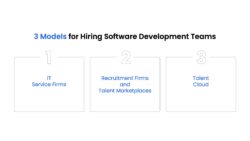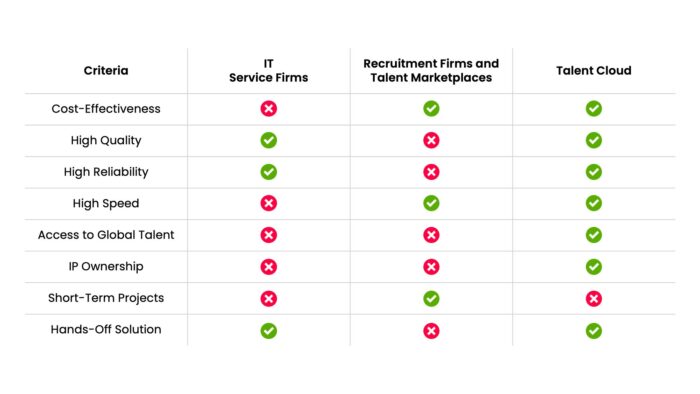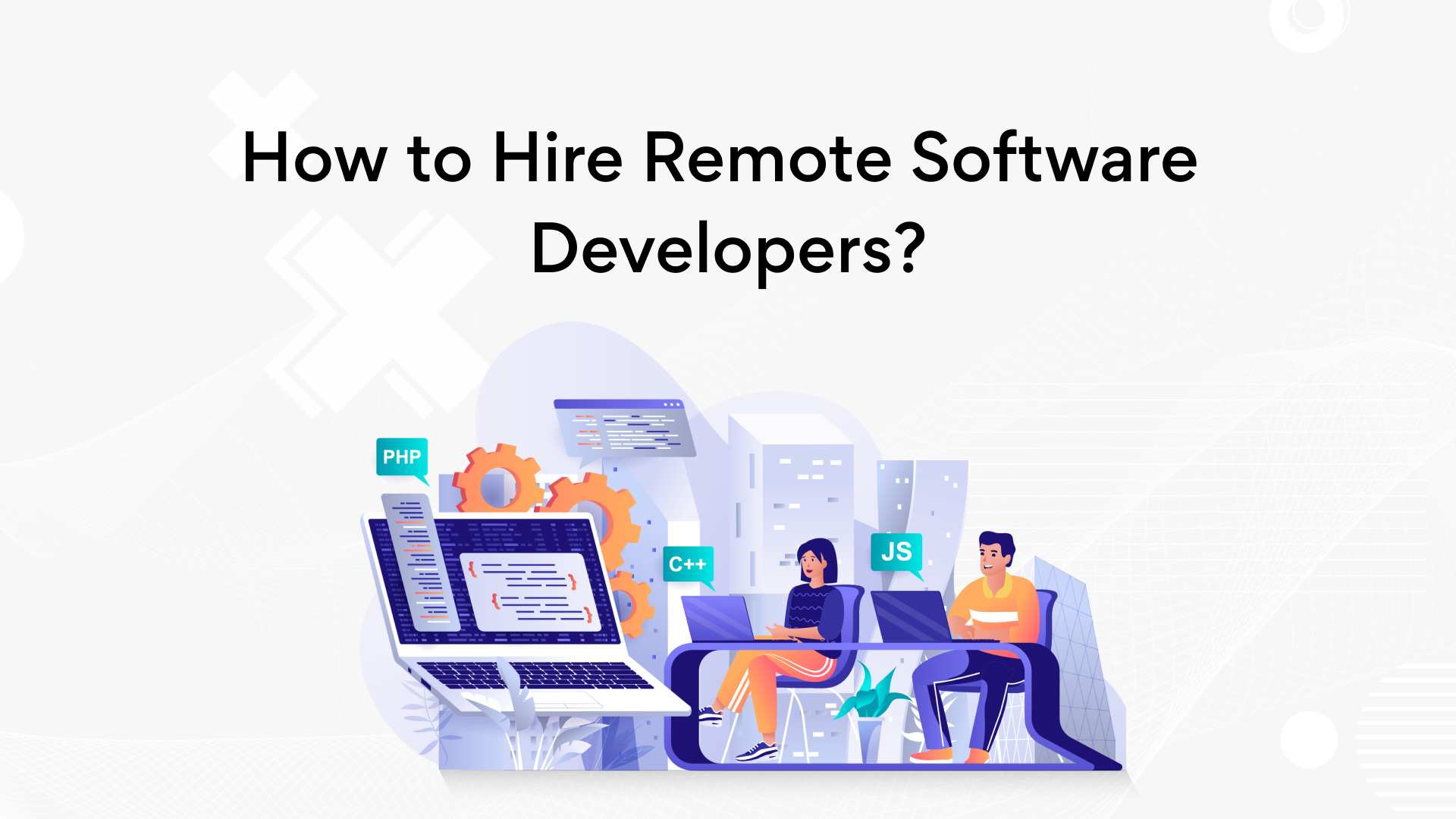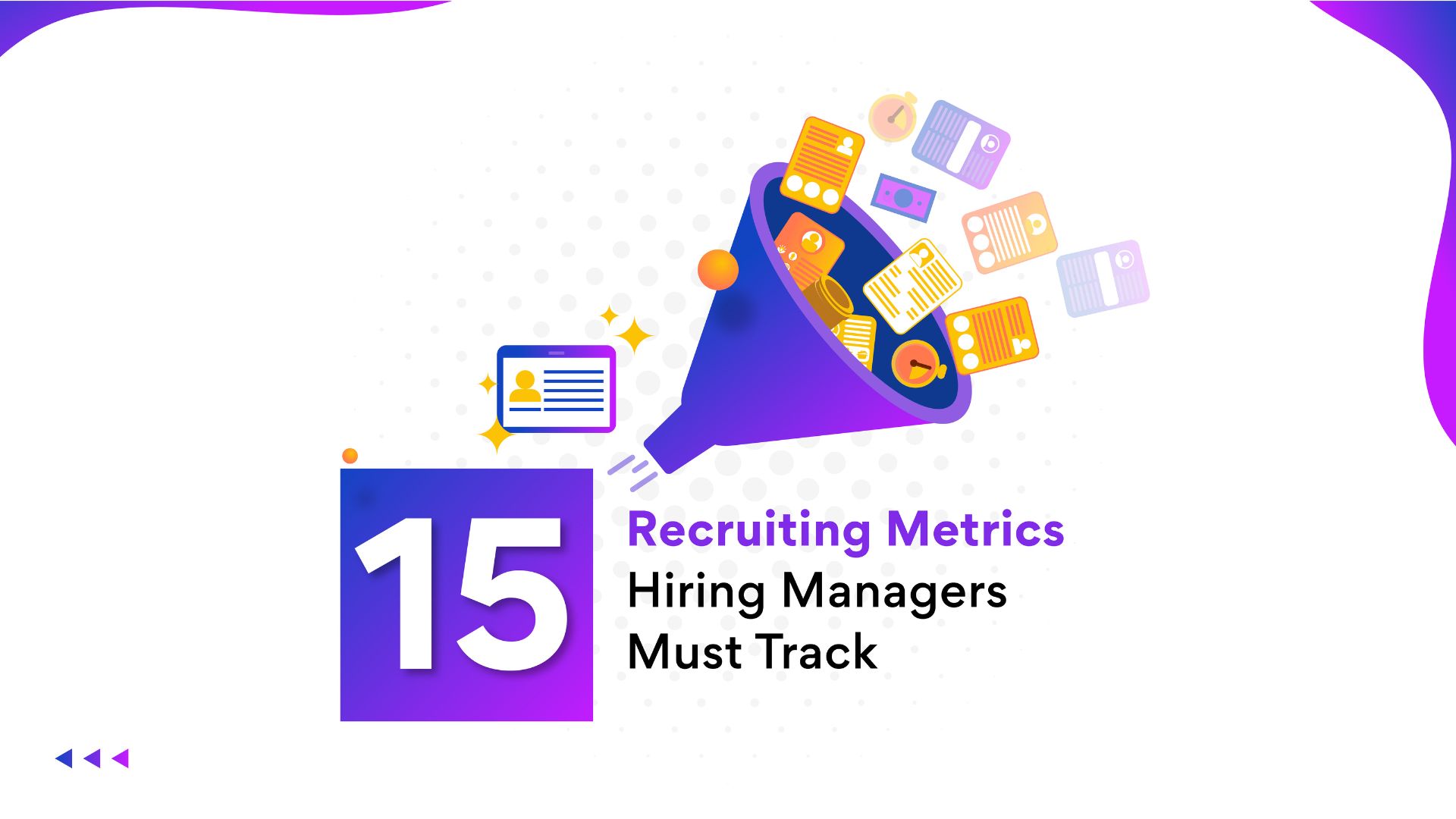Finding the Best Alternative to IT Service Firms for Hiring Software Development Teams
Today, every company is a software company, whether they recognize it or not. As a result, the tech hiring market is becoming increasingly competitive. But traditional recruiting partners like IT service providers weren’t built for a software-first world. This challenge has led companies worldwide to seek a cutting-edge alternative to IT service firms.
Tech Hiring: Current Scenario
Finding, hiring, and retaining the right tech talent is tricky. Take a look at these stats:
- Software development will be the most important tech job in the future. The Bureau of Labor Statistics recently revealed that there will be 1.2 million unfulfilled software engineering positions in the U.S. by 2026.
- Hiring technical employees takes 50 percent longer than other positions, taking around 66 days to find the right software professional for a job.
- Yet another report highlighted that software developer openings will grow by 25 percent from 2021 to 2031—much faster than the average for all occupations.
As a result of this growing demand for tech talent, many organizations struggle to hire developers, leaving critical tech jobs unfilled.
Three engagement models for hiring software development teams
Today, the market has three main engagement models for hiring software developers. Let’s look at them one by one.

Three engagement models for hiring software development teams
IT service firms
Located in regions like India, Eastern Europe, China, and South America, these offshore giants employ thousands of developers. Naturally, these providers cater to mostly enterprise-level projects owned by large corporate clients with massive budgets. But if you’re planning to build a team through an IT service provider, there are some clear benefits and limitations you should consider.
Benefits of IT service firms
-
Cost-effective for large projects
IT service firms help large-sized businesses cut down their operational costs, including those associated with buying new hardware, training IT staff, and paying the salaries of in-house IT professionals. -
Data compliance support
Businesses today must meet strict data privacy regulations to protect their customers (and their privacy) from ever-present cybercrime concerns. Hiring developers from an IT service provider allows companies to transfer this responsibility to industry experts who take care of data compliance for them.
Limitations of IT service firms
-
High cost for small to mid-sized projects
Make no mistake, hiring from a reputed IT service firm is rather expensive. These providers charge upfront fees and a few hundred dollars every month, depending on the size of your business and technical needs. Though they charge reasonable hourly rates for large projects, you might want to consider other options if your company employs less than 1,000 people. -
Consistent brain drain
Remote work is growing. A 2022 study by McKinsey & Company revealed that when people have the option to work flexibly, 87 percent take it.
Related Post: Reasons Your Software Team Should Switch to Remote Work in 2024
Given that the most capable people can now choose to work wherever they want, from wherever in the world they choose to live, the traditional IT services industry is struggling to attract top talent and dealing with an unrelenting brain drain. -
Shallow vetting and a limited talent pool
Quite often, when IT services finally find talent, the candidates may not be right for your job. This challenge stems from the inflexibility of the IT services model. These companies find local talent from cities like Bangalore or Shanghai but, unfortunately, cannot leverage the global remote talent pool.
In other words, the service will often force-fit your needs to their talent. A poor developer is worse than no developer, and you might waste even more time trying to undo their mistakes. -
Loss of IP ownership and control
With IT service firms, you rarely have complete control of your intellectual property. And though most businesses are aware of this, lack of full IP ownership is a significant limitation of IT service companies.
These were some of the most significant limitations of IT service companies. While many businesses still rely on IT services to meet their hiring needs, there’s a trust factor that limits how invested you’re willing to be when facing mismatched talent and concessions on control. And thus, some have turned to alternatives to IT service firms.
Recruitment firms and talent marketplaces
This segment is arguably the most crowded one in the market today. Today, the tech market is composed of numerous recruitment firms and online talent marketplaces with developers specializing in different technologies. Most of these providers are in the scrappy startup stage. Understandably, only some of these platforms are established market players with excellent quality standards.
Let’s examine the benefits and limitations of recruitment firms and talent marketplaces.
Benefits of recruitment firms and talent marketplaces
-
Cost-effective
Since these firms and marketplaces usually have variable standards for quality, they can help you find developers at a lower price. This alternative to IT service firms can be cost-effective without promising talent quality. -
Developers open to short-term commitments
Most developers on these platforms work on multiple jobs simultaneously and are usually more open to short-term projects. Online talent marketplaces are a good option for you if you’re looking to hire talent for the short term.
Limitations of recruitment firms and talent marketplaces
-
Low reliability and continuity
Most of these firms are in the scrappy startup phase, so their internal processes still need refinement. Despite their growing talent pool, these firms may not yet be capable of handling huge workloads. Additionally, gig-oriented marketplaces may not provide companies with the continuity required for building complex products. As a result, reliability is a big issue with these platforms. -
Hit-or-miss quality
In our conversations with developers, we found that highly skilled developers strongly prefer long-term engagements over gig work. Therefore, marketplaces attract more “nights-and-weekends” hobbyist developers. So you either get a skilled developer by chance—or you don’t.
Related Post: What is Software Quality Assurance and Why Is It Important? -
Time-consuming
Finding the right match through a recruitment firm or online talent marketplace takes a lot of time. One of the key challenges we hear from engineering leaders is that they need to interview up to 30 developers to hire one with many marketplaces.
All things considered, the limitations of recruitment firms and online talent marketplaces outweigh the benefits. As a result, many companies are considering the third engagement model for hiring software development teams – the Talent Cloud.
Talent Cloud
A Talent Cloud is a relatively new solution in the industry. Talent Clouds use software to automatically source, vet, and manage talent worldwide, providing many benefits over traditional talent acquisition services or platforms. Due to its range of benefits, the Talent Cloud is quickly becoming the preferred alternative to IT service firms and marketplaces for hiring software development teams.
Benefits of a Talent Cloud
-
Access to a global pool of talent
Instead of attaching people in specific locations to specific jobs and force-fitting your organization’s needs to whatever talent is available, the Talent Cloud uses an AI-driven ranking and matching algorithm that connects developers worldwide with the most suitable opportunities for their skill set.
Related Post: 5 Ways Companies Can Hire the Best International Talent -
Rigorously vetted high-quality developers
Given the volume of available global talent, Talent Cloud’s vetting processes tend to be more rigorous than other service providers. For example, Turing’s Talent Cloud vetting process utilizes over 20,000 Machine Learning (ML) data signals to analyze candidates’ tech and soft skills to find the best organizational fit.
Related Post: Here’s How Turing Leverages AI for Matching and Evaluating Developers
These vetting engines can assess developers’ computer science expertise and knowledge of specific technical skills, including machine learning, infrastructure, and cloud computing. Last but not least, they leverage information on soft skills such as communication, language fluency, and collaboration for deeper candidate assessment. -
Saves time on sourcing and onboarding candidates
The demand for engineering talent is at an all-time high. Last year, researchers from LinkedIn’s Economic Graph team analyzed the profiles of 400,000 hires across 15 industries on the platform from June 2020 to March 2021. The results revealed that engineering topped the most hard-to-fill tech jobs list with the most extended wait.
Talent Clouds are a highly preferred alternative to IT service firms because they operate on significantly shorter timelines and can quickly scale from staff augmentation to dedicated development teams. For Turing Teams, it takes an average of two weeks to build and deploy a dedicated team to your organization—including delivery and program management, tech leads, and developers.
This singular focus eliminates the time usually spent on sourcing, vetting, and onboarding people for your projects, giving you more hours to manage and grow other parts of your organization while your Turing Team operates indistinguishably from the rest of your company.
Related Post: 10 Tips to Onboard Remote Software Developers -
A hands-off solution to complex, hands-on problems
A critical limitation of IT services companies is their inability to provide customized solutions. In contrast, Talent Clouds offer highly customized solutions.
For example, Turing Teams works closely with your organization to understand your problems and develop a clear roadmap, execution plan, and development strategy to help you reach your desired outcomes. Once a clear strategy is in place, Turing will specify the necessary products and services, dependencies, integrations, data models, and hosting infrastructure you will need to succeed. Turing will then provide specialized, on-demand engineering teams for your project. In other words, Turing Teams provides 360° support for all your needs.
Limitations of a Talent Cloud
-
Vetting processes differ, and so does the quality of talent.
There are currently only a handful of providers in the Talent Cloud space, and each provider approaches its vetting and sourcing process differently. Thus, the quality of their talent pools can vary significantly. -
Lack of support for short-term projects
While it varies from provider to provider, Talent Cloud services work with companies looking for long-term engagements to provide better career opportunities for their developers and better overall client experiences.
Overview: IT Service Firms vs. Recruitment Firms and Talent Marketplaces vs. Talent Cloud

IT Service Firms vs. Recruitment Firms and Talent Marketplaces vs. Talent Cloud
To sum up
Your preferred model of hiring software developers depends on your timeline, budget, and the quality of developers you are willing to work with. When considering speed, quality of vetting, access to a large pool of global talent, and hands-off solutions, the Talent Cloud is a better alternative to IT service firms, recruitment firms, and talent marketplaces.
Learn more about hiring dedicated software development teams to deliver on complex projects with Turing.
Tell us the skills you need and we'll find the best developer for you in days, not weeks.













Interesting article… I have had an unnerving experience with online marketplaces this year. Talent clouds are more than just a buzzword now… it’s high time companies stop looking at them as ‘future tech’
50 days to fill one tech position?!?! Yeah it’s an employees market alright 😎
Nice piece 🙂 Would love to read more about how talent clouds help with onboarding…